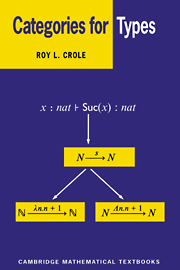6 - Higher Order Polymorphism
Published online by Cambridge University Press: 05 June 2012
Summary
Introduction
Discussion 6.1.1 Let us take stock of the type theories so far introduced in “Categories for Types.” We began with algebraic type theory, which gave us a basic framework in which to write down syntactical theories involving equational reasoning. This was extended to functional type theory in which there is a formal syntax for the representation of functions. We then noted that it would be desirable to work with a syntax in which certain programs (terms) yielded instances of a uniform procedure at differing types, this feature being known as polymorphism. We now extend this latter kind of type theory to one in which there is a syntax for describing functions “at the level of types” as well as functions at the level of terms. In this new system, the syntax splits into two levels, let us say level 1 and level 2. At level 1 there are types and terms, and one thinks of the types as “collections” of terms with a similar property. Analogously at level 2 there are (so-called) kinds and operators, and one thinks of a kind as a “collection” of operators with similar properties. These two levels are connected by a distinguished kind, often denoted by Type, which is thought of as the collection of all types. This new formal system will be referred to as higher order polymorphic functional type theory.
- Type
- Chapter
- Information
- Categories for Types , pp. 275 - 314Publisher: Cambridge University PressPrint publication year: 1994



